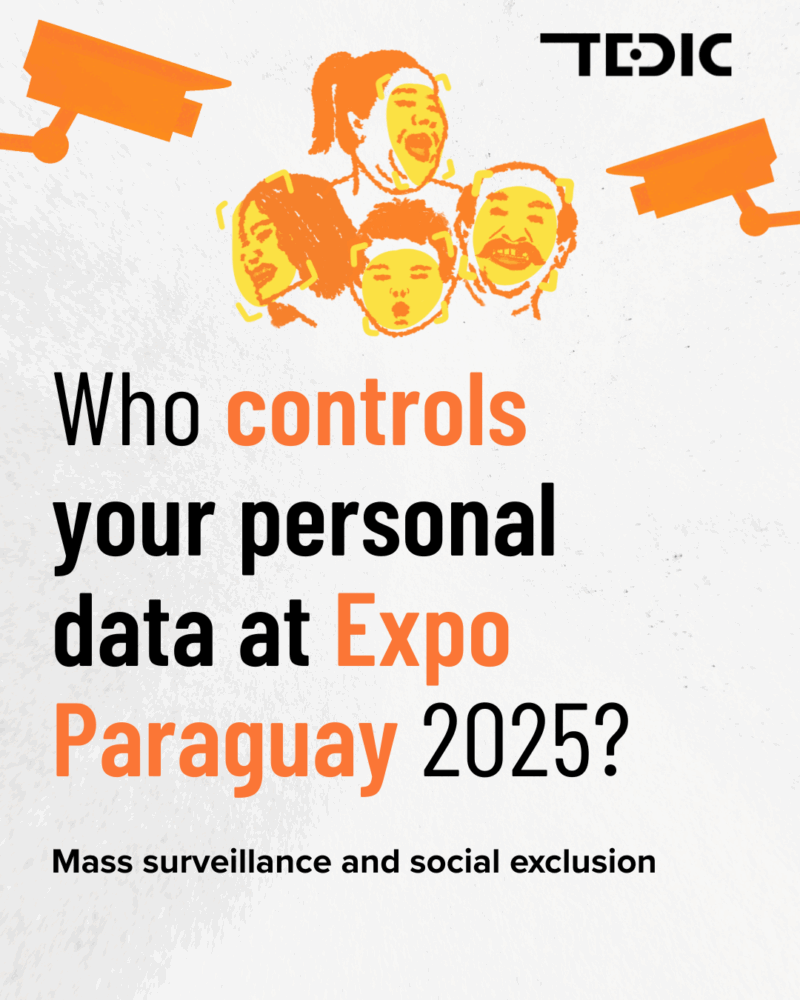
On July 12th, a new edition of the traditional Expo Paraguay 2025 kicked off. It’s one of the country’s most important events, organized by the Rural Association of Paraguay (ARP) and the Rural University of Paraguay. This annual event brings together the national agroindustry and other productive sectors, also serving as a meeting and entertainment space.
However, this year’s edition has been marked by controversy. Despite its economic and social relevance, the Expo has been harshly criticized for implementing a highly exclusionary access system based on advanced technology, lacking inclusion criteria and respect for fundamental rights.
Access that excludes: not everyone can enter
To access the Expo, visitors must use the Tutti app, which only allows payments through Ueno Bank. Entry also depends on biometric verification, either through facial recognition or fingerprint scanning, operated by the company ITTI. The worrying detail: Tutti, ITTI, and Ueno Bank are all part of the same business holding, concentrating the management, control, and processing of thousands of people’s sensitive data in a single economic group.
This not only creates a form of exclusion, especially for unbanked individuals, the elderly, or those unfamiliar with technology, but also poses a serious threat to the privacy of all attendees. As Senator Lilian Samaniego put it, “Not everyone is banked or tech-savvy… this is not democracy, this is exclusion.”
This raises urgent questions that remain unanswered:
What will they do with the biometric data of those who attended the Expo?
Who controls our data?
How long will they store this information?
Beyond the Expo: expanding surveillance without regulation
The concern deepens when we consider that this practice is not limited to the Expo. Currently, facial recognition technologies are being implemented without specific regulation in streets, stadiums, public offices, and institutional buildings. Millions of biometric data—our faces, fingerprints, and movements—are being collected daily without consent or citizen oversight.
At TEDIC, an organization that promotes digital rights, we’ve been warning for years about the rise of surveillance technologies without legal safeguards or transparency. Our recent investigation—based on litigation, access to public information requests, and official document analysis—reveals an alarming situation: the Paraguayan state is deploying facial recognition in an opaque manner, possibly misusing public funds and without a legal framework that protects our fundamental rights such as privacy, freedom of movement, and the presumption of innocence.
Why should we be concerned?
Biometric data like our fingerprints, faces, irises, voices, or gait are unique and irreplaceable. Unlike a password, they cannot be changed if compromised. If a database containing this information is breached—as has already happened in Paraguay in 2023 and again in recent months—the consequences can be catastrophic: someone could use your data to carry out procedures, access accounts, or impersonate you without your consent.
That’s why it’s crucial to understand that biometric data are sensitive personal data. Their use must be strictly regulated based on principles like minimization, informed consent, proportionality, and transparency.
A necessary and urgent law
Since 2021, TEDIC—along with the Personal Data Coalition and other civil society organizations—has been pushing for the “Personal Data Protection Law”, developed collaboratively with multiple sectors including Congress, academia, the private sector, and public institutions. The bill has already passed in the Chamber of Deputies and is awaiting Senate approval.
This law establishes clear definitions and fundamental principles, such as free and informed consent, security and confidentiality, transparency and accountability, and data subject rights. It also proposes mechanisms for anonymization, blocking, impact assessment, and penalties for security breaches, providing real tools to protect citizens.
What TEDIC proposes
Given the current landscape, we make three urgent calls:
- 🚫 Suspend the use of facial recognition and other biometric technologies until a strong personal data protection law with a human rights focus is passed.
- 💬 Encourage public debate on the importance of regulating personal data processing in Paraguay.
- ✅ Urgently approve the “Personal Data Protection Law” to ensure that our individual freedoms are not violated by corporate or state interests.
📣 A call for citizen action:
We cannot speak of democracy when you’re required to hand over your face to enter a fair.
There is no inclusion when basic services and public access depend on an app or a single bank’s card.
There is no freedom when your behavior is being recorded and stored without your knowledge or consent.
Who controls your data? For how long? Under what criteria?
What will they do with your face, your fingerprint, your digital identity?
👉 It’s time to demand answers.
👉 It’s time to defend our rights.
Because without regulation, there is no protection. Without protection, there is no freedom.
📢 Join the debate. Speak up, share, stay informed.
Demand a Personal Data Protection Law NOW.
#PersonalData #PrivacyIsARight #TEDIC #Expo2025 #BiometricSurveillance #DataProtectionLawNow #Paraguay

 [Research] Technology-facilitated gender-based violence against women politicians in Paraguay
[Research] Technology-facilitated gender-based violence against women politicians in Paraguay